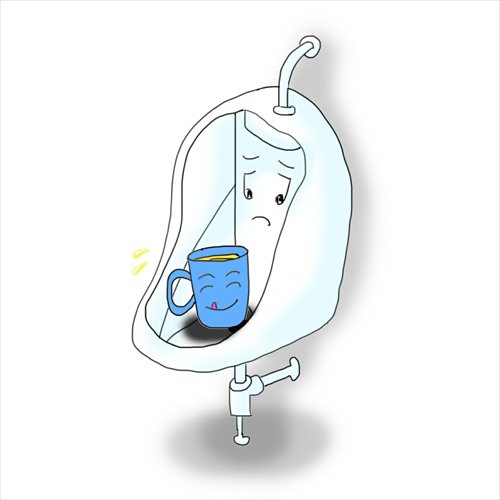Urine therapy is a piss-poor Chinese medicine

Illustration: Lu Ting/GT
An elderly man in his 80's from Chengdu is reported to have been drinking his own pee for the past 23 years. He claims that he gulps down 1,000 milliliters of urine five times per day. Calling himself the chief managing director of the China Urine Therapy Association, the man's antics have, um, pissed off a lot of netizens recently, with many saying it's gross and unclean and others decrying it as a mockery of Traditional Chinese Medicine (TCM), which already has a notorious reputation.
I've never tasted my own urine, so I was a bit shocked to read that there are over 100,000 devout followers of urine therapy in China. Every morning across our nation, while most of us sip tea or coffee, there are many others sipping a nice warm cup of body waste. It makes me gag to think about it.
Prior to getting shut down by the Ministry of Civil Affairs, the China Urine Therapy Association boasted many well-educated and wealthy members from the upper crusts of Chinese society. A retired associate professor from Southwest University of Political Science and Law was one such member, who drank his own pee for 24 years until he was recently diagnosed with kidney failure and diabetes.
So why is urine therapy so popular in China? Part of the reason is that many ancient Chinese medical texts, which among the TCM crowd are considered consecrated, recognized the medical advantages of urine. Seniors in a village in Shaanxi Province are known for their "urine banquets," which they believe keeps them healthy.
One of the most popular and enduring forms of urotherapy in China involves drinking the pee of little boys under 10 years old. Virgin boy eggs (tongzidan), which are eggs boiled in vats of prepubescent pee collected from primary schools, are considered a delicacy and local intangible cultural heritage in Dongyang, a city in Zhejiang Province.
Urine therapy is often advertised in China to have significant effects on chronic and incurable diseases. Periodicals published by the China Urine Therapy Association include testimonials by individuals who successfully recovered from hepatitis, cataracts or rheum arthritis after drinking urine.
Since such chronic diseases typically require patients to take serious medicine and receive expensive medical treatment, urine therapy tends to be an attractive alternative for individuals who have lost their confidence, patience and money in Western medicine. Compared with the bitter herbal concoctions of most TCM ingredients, drinking one's own pee is far less bitter or expensive.
A 21-year-old male from Hubei Province with hyperthyroidism started urine therapy after trying Western medicine. Though in the beginning, he felt sick and shameful about drinking his own pee, he gradually got used to the astringent smell and taste. The young man now claims that he has fully recovered from his ailment and attributes it to urine.
Western medicine practitioners deny any medical advantages of urine, but they also note that there is no scientific evidence that proves urine has no medical use. Urine is approximately 95 percent water and five percent nutrients and minerals, so there's little risk of toxicity. As many pro-Urophagia people have pointed out, a glass of urine may in fact be more rich in vitamins than Vitaminwater, which has been exposed as having no vitamins.
Promoters of urine therapy tend to target Chinese senior citizens, who statistically are most gullible and vulnerable to health care product fraud. Yan Yusen, a special adviser at the China Urine Therapy Association, counters this charge by explaining that the elderly are more open-minded and have more faith in alternative medicine, which is why they see results from drinking pee. Conversely, Yan said, modern doctors and other closed-minded patients won't benefit from urine therapy due to their pessimism.
In other words, what Yan and the China Urine Therapy Association are promoting is in fact not urine itself but the Placebo Effect. In which case, if we just eat healthy, exercise regularly and don't have unhealthy habits, there's no good reason why anyone should have to resort to peeing into their thermos.
The opinions expressed in this article are the author's own and do not necessarily reflect the views of the Global Times.